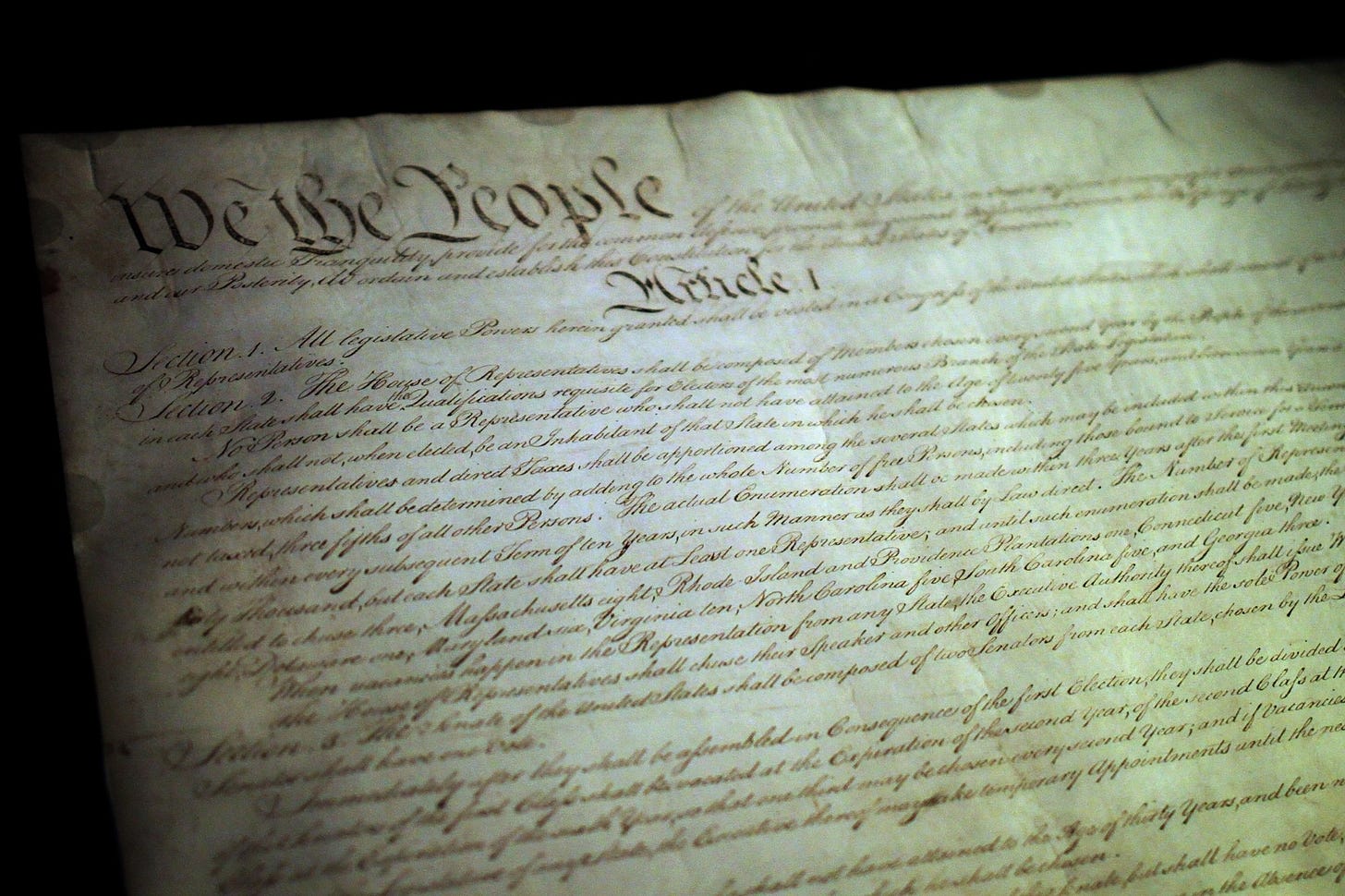The Spirit of the Constitution
The enduring power and unique quality of the Constitution has allowed the American Republic to endure while so many other republics and democracies have come and gone in the time since it was written.

Alexander Hamilton began the first essay of The Federalist Papers by writing that Americans were uniquely positioned to answer the question of “whether societies of men are really capable or not of establishing good government by reflection and choice.” During the Ratification Debates, we answered the question with a stirring “YES.” Federalists and Anti-Federalists alike made arguments for their positions. They did not impose the Constitution on an unwilling America with the strength of the Army and the reputation of George Washington. Instead, “reflection and choice” decided the fate of America.
The Constitution has remained bent but unbroken ever since. The United States has persevered in maintaining the rule of law even through times of war and civil war, thanks to the combination of the immanent qualities of the Constitution itself and the spirit of the American people. Our great achievement was only made possible because the Constitution, like no other major constitution before it, was constructed by a combination of political art and political science.
The Founders were indebted to what Thomas Jefferson called “the elementary books of public right,” which included early modern thinkers like John Locke but also ancients like Aristotle and Cicero. The ancients separated the “arts” from the “sciences.” Science studied a thing, and art put it into practice. Ideals like the philosopher-king waxed lyrical about the need for these things to come together in a single person—knowledge informing practice and vice versa in a virtuous cycle. Yet such combinations were rare.
Cicero, for example, lived in an age of choosing between greater and lesser tyrants, a young man when Sulla marched on Rome to hand down reforms at the point of a sword. Yes, Cicero would go on to become a great Senator and a great thinker, but he was ultimately defeated. The greatest candidate for the title of “philosopher king” was killed by the Triumvirate and never laid down a constitution of his own.
Down through history, this story was repeated, with most men who thought deeply about the political sidelined by those who took on the political art without the reservations of conscience or the guidance of political science. Thousands followed in Cicero’s footsteps as men whose deep thoughts penetrated only the minds of those willing to listen and never those in power. Soldiers dictated policy at the end of a sword or, later, a gun. Powerful politicians are nearly always more worried about their own success than principles or the welfare of the people.
As governments came and went, it was the political art, not the political science, that set new constitutions. By the time of the American Founding, people doubted if political science could ever take the reins again. Edmund Burke was, by then, already a Member of Parliament, but he never wielded significant power, leading Charles James Fox to declare him “wise too soon.” Even in the modern era, Winston Churchill famously declared that “a man’s Life must be nailed to a cross either of Thought or Action” in My Early Life.
So when the Framers set out to create a constitution on the basis of reflection and choice, science and art, thought and action, they were doing something which felt nigh impossible. A cadre of Americans, all politicians in their own right, could have created a constitution without appeal to political science, only to their political art. They could have simply debated endlessly and produced something that was impractical or unworkable due to a refusal to appeal to the political art. However, when they came together, they overcame the inertia of history and human nature to create the Constitution.
It is thanks to the Constitution’s combination of thought and action, art and science that we persist in the rule of law to this day. Though it could have been a mere moment of historical accident that there were so many who sought to combine art and science in their nation’s politics, that generation of Founders instilled their spirit into the Constitution itself. They knew they could not trust to the rule of man, since, as Federalist #10, declares “Enlightened statesmen will not always be at the helm.”
The rule of law is the rule of the spirit of the Framers, carried to us through the Constitution. It is this American spirit which persists to this day, the spirit of freedom which requires both thought and action to maintain. The rule of law has staved off many tyrants, made possible by the guidance of the Constitution, which takes the place of enlightened statesmen when there are none to be found.
Without the Constitution, all would be accident; we would have no frame within which we would take political action, no rule of law to which we could appeal. Yet, on the other hand, without the persistence of the American spirit and the consistent choice of the American people to uphold that Constitution, it would indeed be a mere “parchment barrier.”
It is a testament to the Constitution’s enduring power and unique quality that so many other republics and democracies have come and gone in the time since it was written. For that, we must thank the reflection and choice not only of the Framers, but also of successive generations. It falls to us now to make the same choices, to face the world with the power of thought and action guided by the Framers’ vision of a free and prosperous America.
Jacob Nestle is a Master’s student at Ashland University studying American History and Government, having previously received a Bachelor’s degree from that same institution in Political Science and Philosophy. He currently serves as Donor Outreach Officer at Students for Liberty in Ohio and as Politics Editor at The Vital Center. @JN4Liberty



